A day in the life of a sponsored child in Zambia
Duncan, a member of staff from World Vision UK recently went on a trip to Zambia and while he was out there, his mission was to find out how sponsored children, just like yours, live in Zambia. Duncan met with a child, called Edwin, to find out what a day is like in his life – so that he could blog about it and share the experience with you.
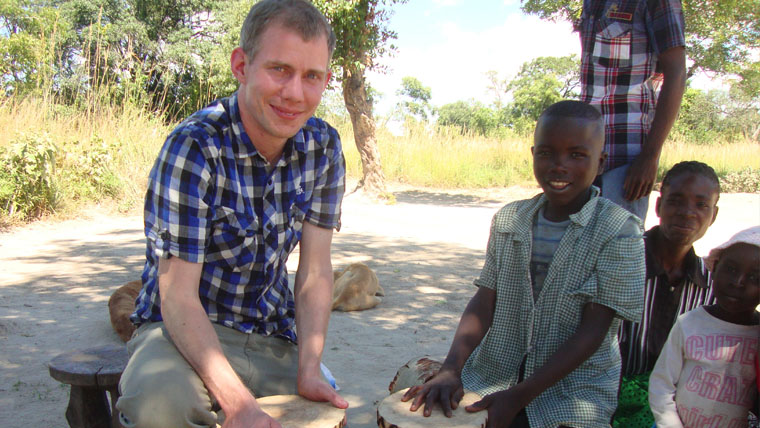
By Duncan Proctor, World Vision UK
It is still dark when we set out from the World Vision office, bumping along dusty tracks through the scrubland of tall grass and stunted trees. We’re on our way to visit Edwin, aged 12, so that I can see what an ordinary day is like for a sponsored child in Zambia.
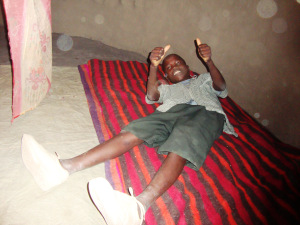 It’s about 6:30 am when we arrive, but Edwin is already up and waiting for us. He is shy at first, but keen for me to see where he lives. Edwin shows me the inside of the hut where he sleeps with his three brothers. “This is our bed,” he says. “We sleep here and normally we get up at about 6 o’clock.”
It’s about 6:30 am when we arrive, but Edwin is already up and waiting for us. He is shy at first, but keen for me to see where he lives. Edwin shows me the inside of the hut where he sleeps with his three brothers. “This is our bed,” he says. “We sleep here and normally we get up at about 6 o’clock.”
“Then in the morning I have a bath,” Edwin tells me, showing me the shelter where they wash. I ask him if he has to go and collect water in the morning. “I use the water that my mother has brought,” Edwin replies, pointing out a large tub of water next to the hut that they use as a kitchen. Edwin leaves for school at about 6.45 am. He and his brother Ernest walk with a friend, carrying their exercise books in their hands.
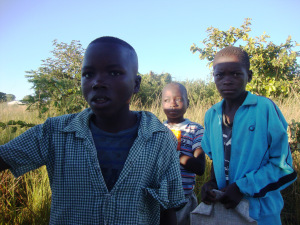 It’s only a couple of hundred metres to the school. When we arrive, the children are just milling around. I ask Edwin what is happening, and when the classes will start. “It will start at 7 or 8,” he tells me. It just depends what time the teachers get there, and whether they have to wait for some of the students who travel in from a long way off. Edwin says they have exams coming up in less than two weeks, so they are doing revision classes.
It’s only a couple of hundred metres to the school. When we arrive, the children are just milling around. I ask Edwin what is happening, and when the classes will start. “It will start at 7 or 8,” he tells me. It just depends what time the teachers get there, and whether they have to wait for some of the students who travel in from a long way off. Edwin says they have exams coming up in less than two weeks, so they are doing revision classes.
A teacher arrives, and the children start lining up. The teacher leads them in some exercises while they are stood in line: Arms up! Arms forward! Arms down!
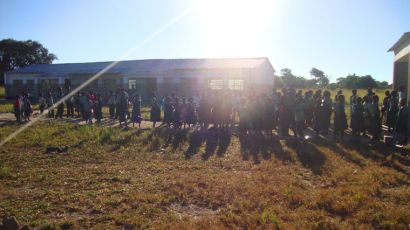
I learn that this school was built with the support of World Vision, with the community providing some of the resources. The school still doesn’t have enough trained staff, as the government will only provide teachers if the school is able to make quality housing available for them. Hopefully this will change soon, as World Vision is supporting the community in their plans to upgrade the teacher’s accommodation in the coming months.
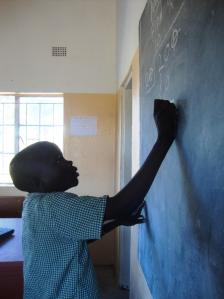 I sit with Edwin in class to see what his lessons are like. First up is mathematics, and the topic is division.
I sit with Edwin in class to see what his lessons are like. First up is mathematics, and the topic is division.
Edwin is a keen student, putting his hand up every time the teacher asks a question. When he is called up to demonstrate division at the front of the class he gets the answer right first time.
Mathematics is followed by literacy, and then there is a short break at 10 o’clock. I want to see how they usually spend their break time, but I soon realise that there is no hope of remaining a casual observer as the children all crowd round me wanting to shake hands. I try to shake hands with all of them, but it quickly becomes apparent that a single handshake isn’t enough, and they are all coming back for more!
The break signals the end of the school day for the children from grades one to three. But Edwin, who is in grade four, still has classes to attend – and they’re revising literacy again. There are more than 80 students in this class, and their teacher doesn’t yet have any formal training. But the students are keen to learn, and dozens of hands go up every time the teacher asks a question.
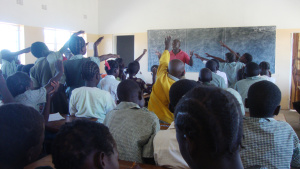 Classes finish at midday and Edwin and his brothers and sisters head back to the house for lunch. Edwin tells me he is very hungry, as he didn’t have breakfast this morning.
Classes finish at midday and Edwin and his brothers and sisters head back to the house for lunch. Edwin tells me he is very hungry, as he didn’t have breakfast this morning.
Edwin’s mother is cooking okra when we arrive. While she prepares the rest of the food, Edwin is keen to show me around the huts where they live and the enclosures where they keep the animals.
The square hut in the foreground is where Edwin’s parents and sisters sleep, and it also has a small lounge area with a sofa, divided from the sleeping area by a curtain. The round on the left hand side is where Edwin and his brothers sleep. It also has two chairs, a small dining table and a desk – and all this in a single circular room with a radius of about three metres. Edwin’s mother jokes – “here is the bedroom, here is the study, here is the dining room, here is the lounge!” Edwin rushes outside and returns carrying a stool so that he can show me how he sits when he is doing his homework.
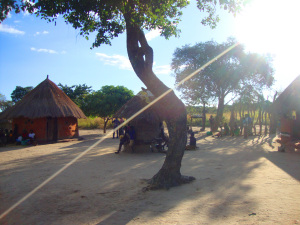
Next Edwin shows me the enclosures where they keep the animals. The family have eight goats, four pigs, and ten cattle that they look after (although only two of the cattle are actually owned by the family).
For lunch Edwin has nshima (pronounced ‘sheema’, this is made from maize flour and is the staple food in Zambia), fried okra, a mushy pulp of pumpkin leaves, and a piece of chicken. “Chicken is my favourite,” Edwin tells me. “But usually we have fish.”
After lunch, Edwin has some time to relax. I’ve brought him some gifts from his sponsor, including a football. His face lights up when I present this to him, and he is fascinated to see the photographs of his sponsor and her family. After the exchange of gifts (Edwin presents me with two wooden stools – one for me, and one for his sponsor) we enjoy a kick-about in the space in front of the huts.
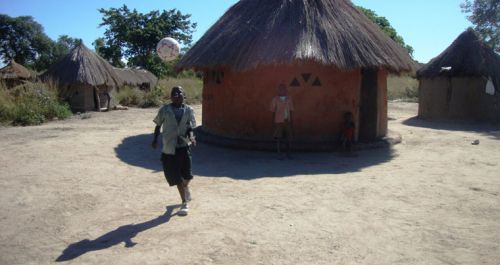
Mid-afternoon Edwin tells me it is time for him to do his chores. Every day, Edwin has to help out by caring for the animals. “I feed the pigs,” Edwin says, “and twice a day I give them water – in the morning before school, and again in the afternoon.”
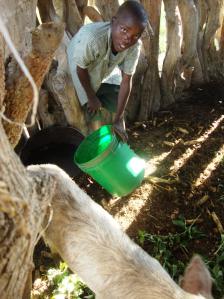 I ask Edwin who takes care of the other animals. He says his younger brother, Goliath (aged 10) is responsible for looking after the goats. The cattle herding duties are shared between Edwin, his older brother Ernest (aged 13) and their father. It takes most of the day to take the cattle to the water and bring them back, so when Edwin has to help out, it sometimes means that he misses school.
I ask Edwin who takes care of the other animals. He says his younger brother, Goliath (aged 10) is responsible for looking after the goats. The cattle herding duties are shared between Edwin, his older brother Ernest (aged 13) and their father. It takes most of the day to take the cattle to the water and bring them back, so when Edwin has to help out, it sometimes means that he misses school.
After he has finished his chores, Edwin heads back down to the school. World Vision is partnering with World Bicycle Relief to provide bikes to school children who would otherwise have to walk a long way to get to school. There is a distribution of bicycles happening in a few days, and the children have been gathering to practice dances and songs for the occasion.
As we watch the children singing and dancing, Mwaka, one of the World Vision community workers, tells me that life is always like this here. “There are not many ways for people to entertain themselves,” she says. “They either play football or they sing and dance. Edwin will be very popular because he has a football, everyone will want to play.”
As it starts to get dark, we say our farewells to Edwin and his family and head back to the office. It’s been a privilege to spend a day with Edwin and see what daily life is like for him. I’m left with so many thoughts, feelings and images from the day, but the one that is clearest in my mind is of Edwin’s smile when I presented him with photographs and gifts from his sponsor. Sponsorship means such a lot to these children, even if we don’t always realise that when we are far away.

Many thanks to Duncan for giving us an insightful glimpse into the life of sponsored children in Zambia. Please ask Duncan any question you may have and head over to our Facebook page here to join the discussion.